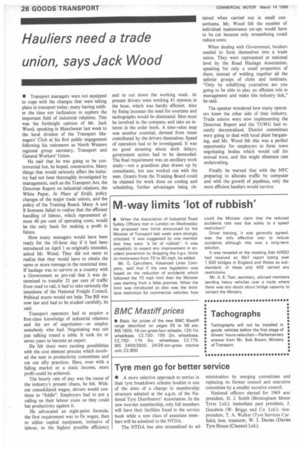Hauliers need a trade union, says Jack Wood
Page 28

If you've noticed an error in this article please click here to report it so we can fix it.
• Transport managers were not equipped to cope with the changes that were taking place in transport today, many having neither the time nor inclination to explore the important field of industrial relations. This was the forthright opinion of Mr. Jack Wood, speaking in Manchester last week to the local division of the Transport Managers' Club at his first public engagement following his retirement as North Western regional group secretary, Transport and General Workers' Union.
He said that he was going to be controversial but, he hoped, constructive. Many things that would seriously affect the industry had not been thoroughly investigated by management, such as the Transport Act, the Donovan Report on industrial relations, the White Paper, In Place of Strife, policy changes of the major trade unions, and the policy of the Training Board. Many A and B licensees failed to realize that the efficient handling of labour, which represented almost 40 per cent of operating costs, would be the only basis for making a profit in future.
How many managers would have been ready for the 10-hour day if it had been introduced on April 1 as originally intended, asked Mr. Wood. They did not seem to realize that they would have to obtain the same or more tonnage in the restricted time. If haulage was to survive in a country with a Government so pro-rail that it was determined to transfer 25 per cent of traffic from road to rail, it had to take seriously the intentions of the National Freight Council. Political stunts would not help. The Bill was now law and had to be studied carefully, he said.
Transport operators had to acquire a first-class knowledge of industrial relations said the art of negotiation—or employ somebody who had. Negotiating was not just talking round a table. It took six or seven years to become an expert.
He felt there were exciting possibilities with the cost element process which involved the men in productivity committees and cut out silly practices. Here, even with a falling market or a static income, more profit could be achieved.
The hourly rate of pay was the cause of the industry's present chaos, he felt. Without consolidated wages, drivers would continue to "fiddle". Employers had to put a ceiling on their labour costs so they could bat productivity against it.
He advocated an eight-point formula. the first requirement was to fix wages, then to utilize capital equipment, inclusive of labour, to the highest possible efficiency
and to cut down the working week. At present drivers were working 41 minutes in the hour, which was hardly efficient. Also by fixing incomes the need for overtime and tachographs would be eliminated. Men must be involved in the company and take an interest in the order book. A time-value map was another essential, devised from times contributed by the drivers themselves. Speed of operation had to be investigated. It was no good moaning about dock delays; government action had to be demanded. The final requirement was an ancillary work study—not a grandiose plan drawn up by consultants, but one worked out with the men. Grants from the Training Board could be claimed for work done on costing and scheduling, further advantages being ob tamed when carried out in small consortiums. Mr. Wood felt the number of individual maintenance set-ups would have to be cut because only streamlining could reduce costs.
When dealing with Government, hauliers needed to form themselves into a trade union. They were represented at national level by the Road Haulage Association, speaking for only a small proportion of them, instead of welding together all the splinter groups of clubs and institutes. "Only by solidifying yourselves are you going to be able to play an efficient role in management and make this industry tick," he said.
The speaker wondered how many operators knew the other side of their industry. Trade unions were now implementing the Donovan Report and the TGWU had recently decentralized. District committees were going to deal with local plant bargaining, and Mr. Wood felt this was a perfect opportunity for employers to form town negotiating bodies which would call for mutual trust, and this might eliminate rate undercutting.
Finally he warned that with the NFC preparing to allocate traffic by computer and with the growth of pipelines, only the most efficient hauliers would survive.




















































































































